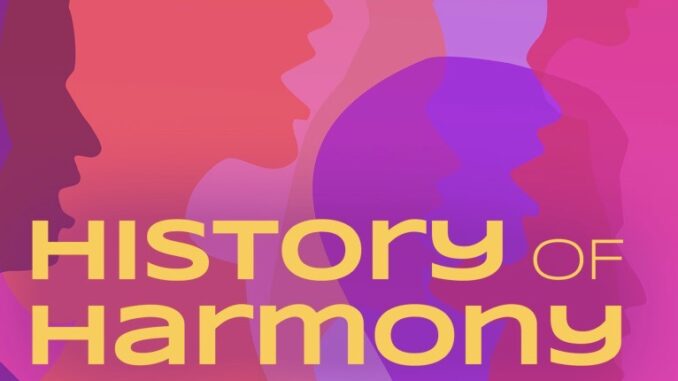
The College of Dupage McAninch Arts Center, more affectionately known as (the MAC) presents Chicago a cappella for its second concert, “History of Harmony,” on Sunday, April 28, 2024, at 3:00 p.m. in the Belushi Performance Hall. Free parking is available in all College of DuPage campus lots. The lot nearest the McAninch Arts Center is labeled Fawell A on the campus map. Tickets are $38 for general admission and $48 for preferred admission.

This is your second and last chance to be thoroughly entertained by a phenomenal professional premier ten-person energetic, dynamic vocal ensemble. If you missed the first performance of Chicago a cappella’s “History of Harmony,” at The Harris Theatre in Chicago, please do not miss this final opportunity. The concert focuses on vocal harmony from the early 20th century until today. The world-class Chicago a cappella singers passionately celebrate every musical genre: Katelyn Lee, (Soprano) Kristin Lelm, (Soprano) Cari Plachy, (Soprano) Chelsea Lyons, (Mezzo-soprano) Emily Price, (Mezzo-soprano) Ace Gangoso, (Tenor) Alan Taylor, (Tenor) Matthew Brennan, (Bass) Joe Lambozetta, (Bass) and John Orduña, (Bass).

Thirty-one years ago, in 1993, Jonathan Miller, a professional singer who came up through the Chicago Children’s Choir in Hyde Park, saw the wisdom of founding an ensemble that “advances the art and appreciation of ensemble singing.” At a singing gig, he had just met Matt Greenberg, Executive Director and founding member of Chicago a cappella. He offered him a ride home. The significance of that ride was profound. Miller shared his dream with Greenberg. He envisioned an ensemble of professional singers at the pinnacle of their careers who could sing various songs in many different languages with verve and excitement. Greenberg was all in and became a founding member of this ensemble. Choirs and ensembles differ from each other both by size and purpose. Choirs generally have music written specifically for them, often religious music. An ensemble is a small group of separate individuals who contribute to a coordinated whole sound. Chicago a cappella is a professional ensemble group of ten singers with exquisite voices, alluring personalities, and the versatility to perform a wide range of diverse musical styles with aplomb.

Deke Sharon, an American singer, composer, a cappella arranger, director, author, coach, and a leading promoter of contemporary A cappella communities, introduced each act with fascinating background information and delightful humor. He is universally proclaimed as “Father of Contemporary a cappella.” Sharon is a masterful, magnificent emcee of this pop music program. He dubbed himself as our sherpa guide to the fascinating history of musical harmony. We were so entertained by the troupe’s singing prowess along with their exuberant personalities adding Deke to the mix was the cherry on top of this delicious sundae. One of the most fascinating facts shared with the audience is from the 1930s, concerning a South African group, the Evening Birds, led by Solomon Linda, creating Mbube (“Lion in Zulu). This smash hit transitioned from Pete Seeger’s “Wimoweh” to what we know now as the Token’s “The Lion Sleeps Tonight.”

Deke Sharon’s resume is impressive. He began singing in choirs at age five. By age eight he was performing professionally with the likes of Pavorotti. After graduating from Tufts University with a Bachelor of Arts in childhood studies and a Bachelor of Arts from the New England Conservatory of Music in Boston, he moved back to San Francisco to form the collegiate a cappella group The House of Jacks. He has taken a cappella singing from Broadway’s In Transit (2016) to Hollywood’s Pitch Perfect 1 (2012) and 2 (2015).

So much love was shared between the performers and the audience at the Harris. The video screen showcasing the artists featured was a terrific addition. I think adding the lyrics in English to the “Mein Kleiner Gruner Kaktus” by the (1934) Comedian Harmonists would be appreciated by those of us not fluent even in rudimentary German. Although, the song is translated within the playbill. My favorite numbers were the Andrew Sisters’ “Boogie Woogie Bugle Boy,” (1941), “Go Your Own Way” (1977), Fleetwood Mac, Kansas (1976), “Carry On Wayward Son,” and “Bohemian Rhapsody” (1975) Freddie Mercury/Queen. My friend favored the Doo-Wop and Motown numbers. We were all invited to whistle to “Don’t Worry, Be Happy” by Bobby McFerrin (1988). The finale was sung by us all. This was a joyous concert everyone will adore.


Deke Sharon shared his final soap opera box thoughts, which included the fact that anyone can sing with training and that vocal harmony can create social harmony. Amen!

Photos Courtesy of: Chicago a cappella, Cindy Kurman, and Jennifer Girard

Be the first to comment